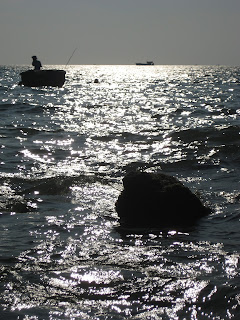I don't have all my reading lists, but a few. Most guidebooks offer some suggested reading. Also, check out http://www.worldcat.org/ to search books related to your travel destination.
I no longer have my reading list for trips prior to Guatemala, but I do remember reading Confessions of an Economic Hitman & Graham Greene in Panama.
We took the following to Guatemala (pay attention 2014 retreat participants!):
Secrets of the Talking Jaguar by Martin Prechtel
Bitter Fruit by Schlesinger & Kinzer
I, Rigoberta Menchu by Rigoberta Menchu
Men of Maize by Miguel Asturias
The Open Veins of Latin America by Eduardo Galeano
A selection from Vietnam:
Paradise of the Blind by Duong Thu Huong
Shadows and Wind by Robert Templer
Buffalo Afternoon by Susan Fromberg
Dispatches by Michael Herr
A People's History of the Vietnam War by Jonathan Neale
A Wavering Grace by Gavin Young
I found Shadows and Wind dry-- it's a collection of essays on Vietnamese cultural, political, and economic life. Compelling subject matter but a poor telling. Buffalo Afternoon & Paradise of the Blind stand out in that grouping, but then again, I love a good novel!
Ecuador & the Galapagos:
Galapagos by Kurt Vonnegut
Savages by Joe Kane
Living Poor by Moritz Thomsen
Darwin in Galapagos by Grant and Estes
The Mapmaker's Wife by Robert Whitaker
I would only recommend Living Poor if you head to the Ecuadorian coast. It's interesting to watch the author's evolving thinking about US-Ecuadorian relationships, but I cringed some on the journey. If you travel in the Ecuadorian Amazon I think Savages should be required reading. Don't be thrown off the title-- it questions whether or not that word applies to foreign companies ravaging the rain forest. Written by a NY Times correspondent it's even-handed and informative.
If you travel from Guayaquil to the Galapagos do what I did & read Vonnegut's Galapagos en route. The experience truly freaked me out. Once in the Galapagos we read Darwin in the Galapagos for context. Good scientific content, but not the best writing. Floreana was a surprisingly fun account of a German woman who moved to the (almost) uninhabited Galapagos island of Floreana early in the 20th century. The memoir certainly enriched our visit to said island!
Heading back to the mainland we picked up The Mapmaker's Wife. The jacket reads like a bodice-ripper, but this is another journalist telling of an historic event, the journey of mapmaker's to measure location of the equator. If you're a scientist, I'd imagine you'd finding the telling substantive & the history interesting. Thankfully for the rest of us, there's also love & intrigue to keep us page-turning.
Kevin bought State of Wonder by Anne Patchett on his Kindle while we were away. I read the book on flights home. It's set largely in Brazil but delves deep into the Amazon. The Amazon is surprisingly distinct, depending on where you visit, but doesn't know borders. After having skirted the border near Tena, the imagery was rich in my mind. The story is gripping and poses serious moral questions I continue to consider.
Belize:
The Possibility of Everything by Hope Edelman
Satsun by Dr. Rosita Arvigo
All good trips require good books.

















































